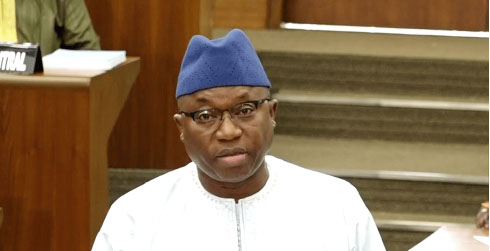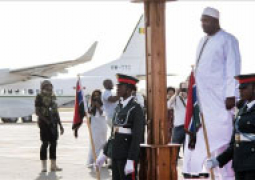
Mr. Njie made these remarks during the 2022 Budget Speech at the National Assembly on Thursday.
He said this is a 16% increase which is equivalent to D4.1 billion. Both tax and non-tax revenues are the source of the increase as government is improving efficiency of revenue collections and limiting the revenue loss through the granting of duty waivers.
According to him, total grants are projected to increase slightly by 2.3 percent from D12.0 billion in 2021 to D12.3 billion in 2022, adding the slight increase is due to a decline in programme grants as support that was received in 2021 for the Covid-19 pandemic would not be forthcoming in the coming year.
“This was however offset by a greater increase in project grants,” he said.
Mr. Njie noted that as part of government efforts for fiscal consolidation, total expenditure is expected to increase slightly by less than two (2) percent from D31.8 billion in 2021 to D32.2 billion in 2022.
Mr. Njie said this is due to a significant decline in other current expenditure as much of the COVID related health expenditure made in 2021 are not factored in the 2022 budget estimates.
Meanwhile, Mambury Njie while tabling the 2022 Appropriation Budget revealed that The Gambia recently signed a grant financing of $50 million with the World Bank for the Additional Financing of Essential Health Services Strengthening Project.
“This financing of the project will go towards improving the quality of essential Primary Health Care Services delivery using a results- based financing approach; community engagements to improve utilisation of quality health services and building resilient and sustainable health systems to support the delivery of quality health services,” he added.
According to him, with support from the World Bank, the government is in the process of building new Health Care facilities to better respond to future emergencies.
The Finance minister said the ministry is drafting the Health Policy 2021-2030 and the Strategic Plan 2021-2025. The policy he said, will guide the ministry in its efforts to strengthen health services and also make them more affordable and accessible to all without compromising quality.
He added that the health sector is at an advanced stage to introduce the National Health Insurance Scheme (NHIS) for the first time in the history of this country.
The scheme he highlighted will serve as a sustainable health financing mechanism in the country and is expected to improve access to safe quality health care services, affordable medication as well as serve as a social safety net for the poor and vulnerable.
“The Covid-19 crisis has shown how vital it is to have a strong supply chain management system that can continue to guarantee the delivery of essential health commodities,” he stated.
The Finance minister further disclosed that as part of Covid-19 relief support, The Gambia received medical supplies worth over D31 million through the South-South cooperation Assistance Fund set up by the People’s Republic of China.




